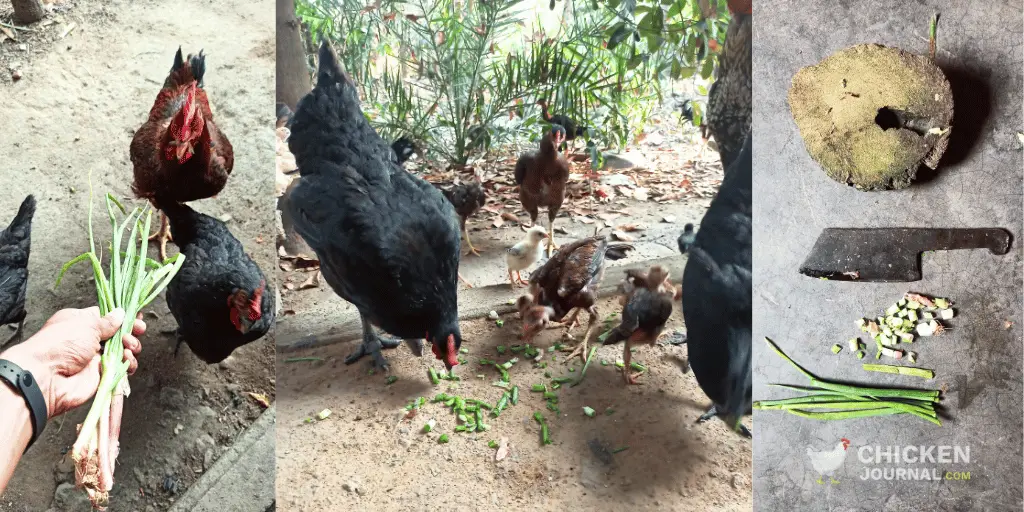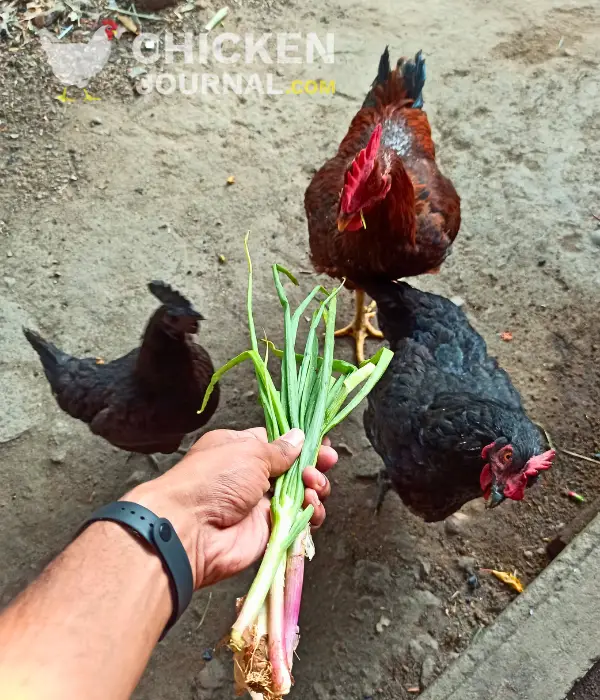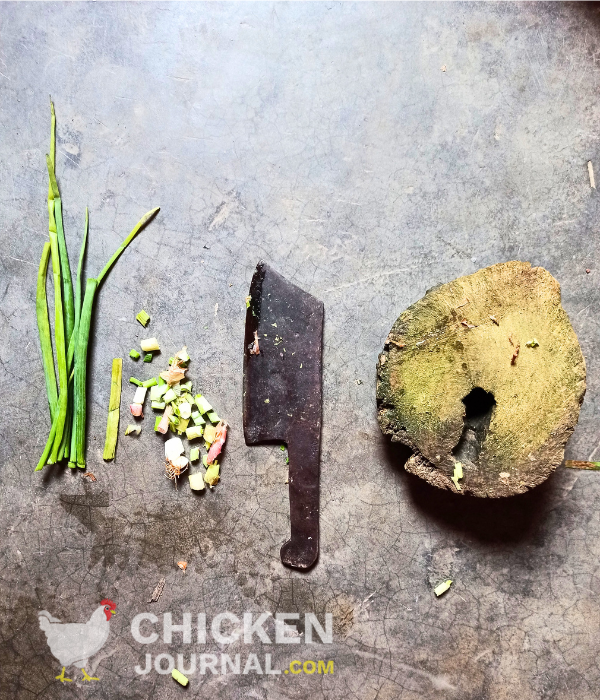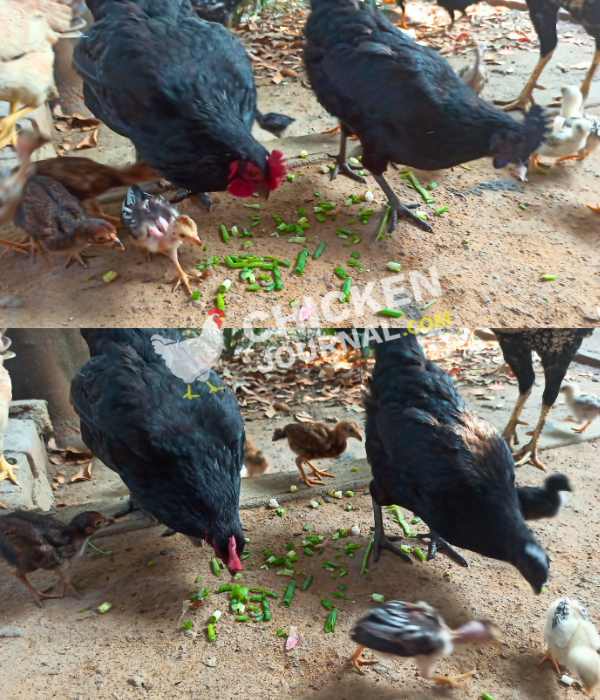
Can chickens eat green onions? Green onions, known as scallions and spring onions, are readily available in most regions of the world.
It’s a common question whether chickens can eat green onions, and there are many myths about feeding green onions to chickens.
Chickens are omnivores, so they eat everything in the backyard. They eat grains, fruits, vegetables, insects, and a few animals’ meat.
Most fruits, vegetables, and insects are healthy for chickens, but few are dangerous because they are poisonous. Some may cause digestive issues, and few can be fatal.
So, when it comes to feeding green onions to chickens, there may be a concern about their consumption.
In this definitive guide, we have explained whether chickens can eat green onions, their health benefits, nutritional values, and other FAQs.
This will help every chicken owner to feed green onions safely to their chickens.
Understanding Chickens’ Dietary Needs
Chickens always need the right food to live healthy and strong. Like mammals, chickens require protein, carbohydrates, fats, vitamins, and minerals.
They require commercial chicken, mostly if raised in a closed environment with foraging restrictions. This type of feed includes pre-starter, starter or grower, finisher, and layer.
You can give them grains like wheat, corn, soybean seeds, and small bits of meat or fish, which provide them with a natural source of protein.
Fruits and vegetables are other fantastic foods that are healthy for chickens. Check the list of the top 100+ chicken treats list.
Chickens don’t have teeth, so grit helps them digest food. Commercial grit or small, rough stones work well. If your chickens forage outside, they will get grits from nature.
Moreover, if we talk about egg-laying hens, calcium is crucial because they always lack it due to continuous egg production. Feeding oyster shells or limestone supplements the hens’ calcium intake.
Adding Green Onion to a Chicken’s Diet

Do Green Onions Help Chickens?
Well, these veggies have some excellent things, like Vitamins A and C. They also contain iron and calcium. But there’s a slight risk, too.
Onions have a thing called thiosulfate. It can cause damage to red blood cells in chickens. Too much can make them really sick. So, in small amount green onions may be ok, but a lot is a no-no.
What’s So Bad About Thiosulfate?
This chemical in onions is not good for chickens. It harms their red blood cells. And then they may get anemia. So while a little bit might not hurt, you don’t want your chickens eating lots of green onions often.
Why Is Knowing Safe and Unsafe Foods Important?
There are a few big reasons you need to know what chickens can and can’t eat:
Their Health: Some foods can make chickens sick or even kill them. You don’t want that! So know what’s safe.
Proper Diet: Their regular food has the right nutrients. Treats that aren’t good can mess that up. That’s not ideal.
Stopping Bad Habits: If you feed chickens the wrong stuff, they may start pecking at other bad things around them.
Green Onions and Chickens
Nutritional Value and Potential Hazards
Nutrition Facts: Green onions, also called scallions or spring onions, have few calories. They contain vitamins A and C, calcium, and iron.
These nutrients can help chickens’ bones and immune systems stay strong. But chickens don’t eat enough green onions for a big nutritional boost.
Potential Risks: Green onions have a compound called thiosulfate. This can damage red blood cells in chickens, causing hemolytic anemia or Heinz body anemia.
A little bit now and then might not hurt. But eating lots of green onions regularly could make chickens feel tired, weak, and lay fewer eggs. It may be hard for owners to notice these signs right away.
Telling Green Onions, Spring Onions, and Onions Apart
Green Onions (Scallions): These are young onion plants, picked before the bulb grows big. They taste milder than mature onions. You can eat the whole green top and white base, raw or cooked.
Spring Onions: People often mix these up with green onions. But spring onions are older, with a larger bulb. They can taste stronger than green onions but not as potent as full-grown onions. You can eat both the bulb and greens.
Onions: Onions are plants with round, thick stems underground. These thick stems are called bulbs. An onion bulb can be white, yellow, or red. Onions are popular because they have a strong, sharp taste.
Can Chickens Eat Onions, Spring Onions, and the Green Tops of Onions?
Can chickens eat onions or green onion tops? Well, the answer is a bit tricky.
You see, all parts of the onion plant, even the green tops, have a compound called thiosulfate. And too much of this compound can be bad for chickens.
So, here’s what you need to know:
Onions: Skip these entirely. Onions are super high in thiosulfate and very strong in flavor. Chickens should avoid onions completely. It’s ok if the chicken has mistakenly eaten one or two pieces occasionally.
Spring Onions: These are like green onions but more mature. They also contain thiosulfate, so don’t feed them to your feathered friends too often, if at all. Occasionally, in small amounts, it can be accepted if given in small amounts.
Green Onion Tops: The green tops are milder than the bulbs but still have thiosulfate. If you really want to give them some, only offer a tiny amount every once in a while.
In short, even though green onions and their varieties seem healthy, the risks outweigh the benefits for chickens. It’s best to steer clear and choose safer veggies that won’t harm your flock. Play it safe and skip the onions altogether.
The Risks of Feeding Green Onions to Chickens

Why Are Certain Foods Like Onions Harmful to Chickens?
Onions can be bad for chickens. They have a natural chemical that can damage chickens’ red blood cells. This chemical is called thiosulfate.
Chickens, like many other animals, can’t process this chemical well. If chickens eat onions often or a lot, it can make them sick.
Specific Worries About Giving Green Onions to Chickens
Green onions have nutrients that are good for people. But for chickens, there are some worries about eating green onions:
Harmful to Blood Cells: The thiosulfate in green onions can damage chickens’ red blood cells. This makes it hard for the cells to carry oxygen, and it can make chickens feel tired and weak.
Blood Problem: If chickens eat green onions for a long time, it can cause a blood problem called hemolytic anemia. This means their body destroys red blood cells faster than it makes new ones. This can make chickens very unhealthy and lay fewer eggs.
Weird Blood Cell Shape: Thiosulfate can also cause Heinz bodies in chickens’ blood cells. These are like bumps in the cells caused by damaged hemoglobin. Heinz bodies make it even harder for blood cells to work right, leading to more anemia.
The Effects of Sulfur Compounds Found in Onions on Chickens
Chickens should not eat onions, including green onions. Onions contain sulfur compounds that chickens can’t process well, which causes health problems for the birds.
Harder to Remove Sulfur From Body: A chicken’s body works extra hard to get rid of the sulfur compounds. This makes them tired and unhealthy. Their ability to grow and lay eggs declines.
Fewer Eggs: For egg-laying hens, onions negatively affect their health. As a result, they lay fewer eggs. This may lead to thin-shell eggs.
While a tiny piece of green onion likely won’t harm a chicken right away, feeding them regularly is risky. Their bodies struggle to handle onions safely.
It’s better to avoid giving chickens any type of onion, including green onions. Choose other, safer foods for a balanced chicken diet instead.
How to Feed Green Onions to Chickens?

It’s not a good idea to give green onions to your chickens very often. Green onions can sometimes make chickens sick.
But if you still want to give them some green onions, you must be very careful. Follow the below steps to avoid mistakes.
Only a little bit sometimes: If you do give green onions to your chickens, only give them a tiny piece once in a while as a special treat. Don’t give them green onions very much or very often.
Watch your chickens: Watch them closely after your chickens eat green onions. See if they act tired or don’t want to eat much. Also, check if they lay fewerer eggs than normal. If you see any of these things, the green onions might be the reason.
It’s always best to talk to a vet before giving chickens foods that might be bad for them, like onions. Animal doctors know a lot about what foods are healthy or harmful for chickens based on research and experience.
They can explain why green onions could make chickens sick and suggest safer, healthier foods instead. Listening to their advice, helps make sure chickens eat a balanced diet that keeps them happy and strong, without any risky ingredients.
Most experts warn against feeding onions to chickens. They say onions could poison chickens, and there are plenty of other yummy treats provide all the nutrients chickens need.
It’s wise to skip foods that might be dangerous when there are safer, more nutritious options available.
But if you ask me, yes, I give green onions to my chickens occasionally every 2-3 months when I bring them from the market or garden. I chop them into small pieces and spread them on the floor.
Few of my chickens love eating the chopped ones, and few like peeking them raw from my hand. Some didn’t like the taste and tried it only once.
Safe Alternatives to Green Onions for Chickens
Chickens need good food for being healthy. There are lots of safe plant foods we can give them.
Green Leaves: Veggies like kale, spinach, lettuce, and Swiss chard have many vitamins. Chickens like to eat these.
Herb Plants: Fresh herbs like oregano, basil, and thyme are okay for chickens. They also keep chickens healthy.
Cucumbers and Squash: These fruits help chickens stay hydrated when it’s hot. They have good nutrition too.
Cooked Pumpkin: Pumpkin is full of vitamins. Chickens like cooked pumpkin tastes yummy. It’s a safe treat for them.
Frequently Asked Questions
Can Chickens Eat Raw Green Onions?
Chickens can technically eat raw green onions, but it is not recommended due to the presence of thiosulfate.
This compound can cause oxidative damage to red blood cells and lead to hemolytic anemia. If you feed them green onions, it should be done sparingly and rarely to minimize potential health risks.
Do Chickens Eat Green Onions Voluntarily?
Chickens are curious eaters and may peck at green onions if they are available in their environment. However, their willingness to eat green onions does not indicate that it is safe or healthy for them.
Owners should monitor and control their flock’s diet to avoid the ingestion of potentially harmful foods.
Can Chickens Eat Red Onions or Onion Leaves?
Like green onions, red onions, and onion leaves contain thiosulfate and pose the same risks to chickens, including the potential for oxidative damage and hemolytic anemia.
It is best to avoid feeding chickens any part of the onion plant, including red onions and onion leaves, to ensure their health and safety.
Can Ducks and Chickens Eat Green Onions Safely?
Both ducks and chickens have similar sensitivities to certain compounds found in green onions, making them potentially harmful to both types of poultry.
Therefore, it is advisable to avoid feeding green onions to ducks and chickens alike to prevent any health issues related to thiosulfate ingestion.
Common Myths About Chickens and Green Onions
Green onions have chemicals that harm chickens. A tiny bit probably won’t hurt. But if they eat some every day, the bad stuff builds up.
This causes health issues, like being sick or weak. So it’s better not to take that chance. Science and vets know what’s safe for your feathery friends. Myths and stories aren’t good enough to risk their well-being.
Conclusion
Chickens eating green onions may not be good for their health. Green onions contain a substance called thiosulfate that can damage chicken red blood cells. This could lead to iron deficiency and other problems for your flocks.
So, it’s better to avoid giving chickens green onions or any type of onions. Instead, feed them safe veggies like leafy greens, cucumbers, and carrots. These foods give chickens nutrients and variety without risks.
If you’re not sure about a new food, ask a vet or chicken expert for advice. They know what’s best to feed your flock based on their needs and situation.
Also, remember to give treats like veggies and extra foods in small amounts – no more than 10% of their daily diet. That way, your chickens get balanced nutrition. Watch for any bad reactions when trying new foods.
We suggest that all chicken owners talk to vets before changing what chickens eat, especially risky foods. Your care can stop health troubles and keep chickens well.
Please tell us about feeding green onions or alike to chickens! Share tips and tales on chicken food. Your input helps other chicken lovers feed flocks better.


Leave a Reply